Determining the Cost of Quaker Parrots: Key Factors
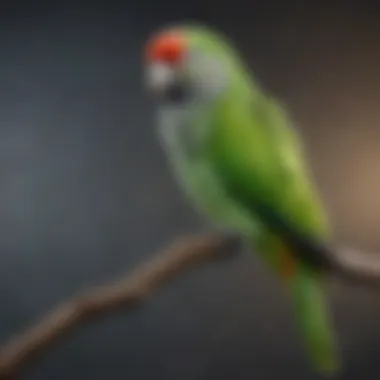
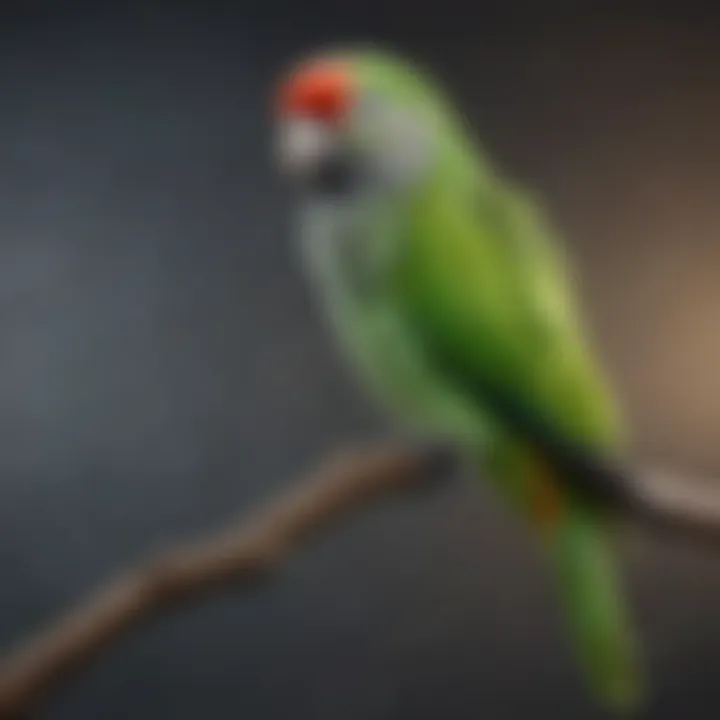
Intro
This examination will guide you through crucial elements such as age, geographical location, breeder reputation, and ongoing maintenance costs that impact the price you might expect to pay. Today, whether you are an aficionado in avian care or a new prospect looking for a feathery companion, knowing how to approach the concept of cost will inform better decision-making for adopting Quaker parrots.
Care Tips
Caring for a Quaker parrot goes beyond mere feeding. A solid understanding of their needs ensures healthy and happy birds, which can also influence their market price due to their condition and care.
Daily Care Routines
Establishing a daily care routine enhances the well-being of your parrot. Provide fresh food and water daily along with ample time outside its cage. This interaction is crucial for physical health and mental stimulation.
Cage Setup and Maintenance
Proper setup is vital for any pet bird. The cage size should be substantial—at least 24x24x24 inches is recommended for a single bird. Ensure your parrot has room to fly horizontally. Regular maintenance of the cage includes periodic washing as well as proper draining for waste materials.
Hygiene and Cleaning Practices
Cleanliness can prevent health issues in birds. At least once a week, change bedding and disinfect the cage. Removing leftover food can prevent attracting pests. Hygiene practices contribute significantly to the overall environment and by extension, the value of the bird.
Seasonal Care Adjustments
Changes in seasons can affect your Quaker parrot's needs significantly. Keep an eye on heat sources in winter and provide ample hydration in summer. Adjust their activity and diet based on environmental changes for sustained well-being. This thorough approach to seasonal care can culminate in a long and vibrant life for your parrot, which again can influence pricing for prospective owners.
Behavioral Insights
Understanding the behavioral aspects of Quaker parrots aids their owners in mitigating challenges. This simply impacts the home environment.
Understanding Bird Body Language
Bird body language conveys numerous signals, such as bonding or distress. For example, relaxed feathers point to a content parrot, while puffed out feathers could indicate discomfort. Observing these cues helps owners respond appropriately.
Common Behavioral Issues and Solutions
Owners often face behavioral challenges, including biting. Frequent human interaction and establishing a routine can minimize such issues. Consider employing the help of a vet if persistent concerns arise, as establishing good behavior often enhances the overall value of the bird.
Positive Reinforcement Techniques
Training your Quaker parrot based on positive behaviors fosters trust. Food rewards or verbal praises help shape desirable actions. Developing this bond can significantly influence how much a buyer might pay if they have proof of a well-trained bird.
Social Interaction Needs
Quaker parrots thrive on social contacts, whether with their owner or other birds. Ensure they have routine interactions to bring out the best in their temperament. An active, well-socialized bird has a more appealing price in the market.
Nutrition Guides
The right diet is critical for your parrot's life longevity.
Essential Diet Components
A balanced diet ensures good health, rich in pellets, fresh fruits, and vegetables. Popular options include leafy greens, apples, and berries while grains help satisfy additional nutritional needs without excess fat. Proper diet stabilizes health and supports longevity.
Safe and Toxic Foods
Knowledge of safe versus harmful foods yet again is crucial. Avoid chocolate, avocado, and caffeine, as these can jeopardize your bird's health. Proper nutrition is directly proportional to how people view the value of owning a Quaker.
Supplements and Treats
Occasional supplements can enhance nutrition but should not replace a balanced diet. Nutritional treats serve not only as rewards but also as necessary supplements. Always consult a veterinarian about appropriate products that contribute positively toward well-being.
Feeding Strategies for Different Species
Each Quaker pigeon can exhibit diverse preferences in the diet. Keeping a consistent feeding schedule opens opportunities to experiment with different types to gauge what they lean towards most, balancing specifically tailored plans thereafter.
Wellness and Health
Routine checks and an adaptive approach definetely aid in preventing health issues. A csv approach encompasses diligence in care practices.
Routine Health Checkups
Regular vet check-ups are vital. Annual health assessments catch developing health issues before they become critical problems. Consistency in check-ups rightly influences perceptions on their overall market cost.
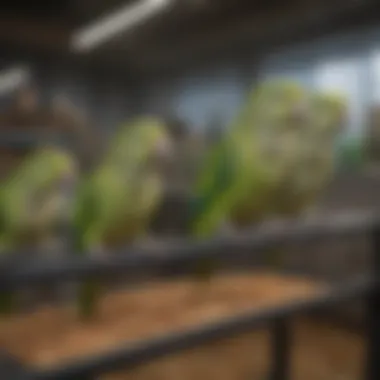
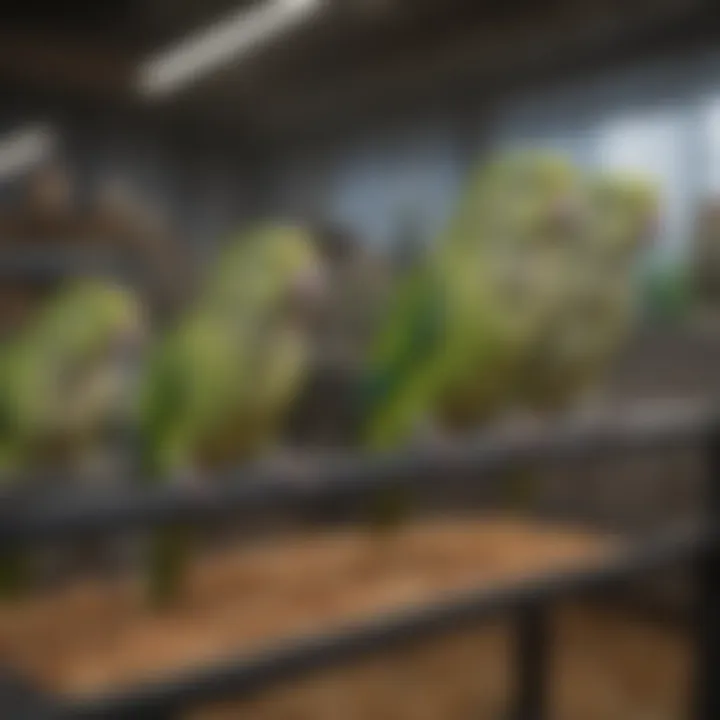
Identifying Symptoms of Illness
Keep watch over their behavior and eating habits. Sudden changes can signal illness. This also applies to vocalization—uncharacteristic silence could also raise a red flag. Being proactive positions you to tackle health challenges promptly.
Preventative Care and Vaccinations
Ensure all vaccinations and health treatments are up to date. Preventative care avoids long-term issues and reflects positively on the ownership history of your bird.
Mental and Emotional Well-being
Stability in environments plays lots toward positive actions at home. Spend quality time engaging with your bird forethoughtfully consider their need, steering clear of situations that may introduce fear or stress contributes positively towards overall health costs.
Enriching Activities
As previously mentioned, physical and mental stimulation is key ongoing needs.
Toys and Playtime Ideas
Offer a range of interactive toys to challenge their minds. Puzzle feeders and chew toys particularly enrich the experience. Varied play patterns trigger their intrinsic instincts, leading longer happier lives.
Training and Tricks
Regular training times build personal connections. Introduce simple tricks or commands. The achievement and the patience needed fosters bond between the bird and the owner.
Outdoor Activities and Interaction
Properly supervise playdates in enclosed outdoor spaces. This variation exposes them to natural stimuli while being safe. You can also bring birds periodically outside in weather where the environment serves apt. Time spent outdoors brings forth joyous experiences.
DIY Projects for Mental Stimulation
Creating DIY toys can heighten mental engagement. Getting fresh materials from natural faucets: untreated wood blocks, paper tubes, or paper bowls forms this easy creativity enhancing hints of interaction for them.
Maintaining a proactive approach to caring for your Quaker parrot both in daily management and engagement deeply nurtures their well-being.
Yet their price derivatives stem not solely from initial expenses but intricate understanding toward overall ownership investment.
Overview of Quaker Parrots
The importance of understanding Quaker parrots cannot be understated, particularly when considering their rising popularity among bird owners. This section highlights fundamental aspects that inform potential buyers about the species. Quaker parrots, known for their vibrant personalities and impressive vocal skills, play a significant role in the avian community. Their prices can vary considerably due to multiple factors that need to be considered by prospective owners.
What is a Quaker Parrot?
Quaker parrots, also known as monk parakeets, belong to the species Myiopsitta monachus. Native to South America, they are medium-sized parrots typically measuring around 10 to 12 inches in length. These adaptable birds are easily recognized by their green plumage and grey chest, giving them a charming appearance. They possess social and intelligent traits, making them appealing to many bird lovers.
When acquiring a Quaker parrot, it is essential to consider their charm and unique behaviors. Their sociable nature means they thrive on interaction. Comprehensive knowledge about what Quaker parrots are is pivotal due to future responsibilities involved with their care.
Characteristics of Quaker Parrots
Understanding the characteristics of Quaker parrots aids in appreciating their value as pets. Quaker parrots are known for their playful and adventurous spirit. They are quite vocal and can mimic sounds and human speech. Their ability to learn and adapt to various environments shows their intelligence.
- Social Behavior: Quakers are inherently social creatures. They enjoy being around people and other birds. This characteristic requires owners to invest time in their socialization.
- Dental Health: Quaker parrots, like many birds, have strong beaks that require proper Keep away from infinitely hosts. Suitable chew toys can assist in maintaining their dental hygiene while providing enrichment.
- Lifespan: These birds possess a relatively long lifespan, typically living up to 20 years with proper care. Their longevity adds consideration for potential owners, as they represent a significant long-term commitment.
In summary, the successful companionship with a Quaker requires acknowledging their unique traits and behaviors. Invest your time to know not just what Quaker parrots are but how to responsibly care for them.
Factors Influencing the Price
The factors influencing the price of a Quaker parrot are critical for anyone considering acquiring one of these fascinating birds. Understanding these variables helps potential owners make informed decisions about their investment. The price is not arbitrary but is determined by a combination of several key elements, each of which contributes significantly to the overall cost. Considering these factors is paramount for ensuring that you do not only choose the bird best suited for your situation, but also ensure its health and welfare.
Age of the Bird
The age of a Quaker parrot often influences its pricing significantly. Generally, younger birds tend to cost more than older ones. This is primarily because younger birds, usually fledglings or babies, are desirable for owners looking to raise or train them from an early age. As birds age, they become less expensive due to decreased demand for a trained or older pet. In addition, the costs to care for older birds may vary, making the initial pricing lower in contrast to their longevity and potential care needs.
Young chicks require more attention and specific care, which can escalate costs upfront. Older birds might have different behaviors, potentially affecting their charm and interactions with owners.
Breeder Reputation
The reputation of the breeder plays a crucial role in determining the price. Established breeders with a good track record of raising healthy and well-socialized birds typically charge more. They often provide essential documentation indicating the bird's lineage, health screenings, and general upbringing environment. Choosing a well-regarded breeder reduces potential health issues and guarantees better socialization of the bird.
Researching breeders via platforms like Reddit or local avian clubs can give owners a better sense of their reputation. Alternatively, breeders with fewer expertise might offer lower prices but at the risk of health problems or behavioral challenges down the line.
Geographical Location
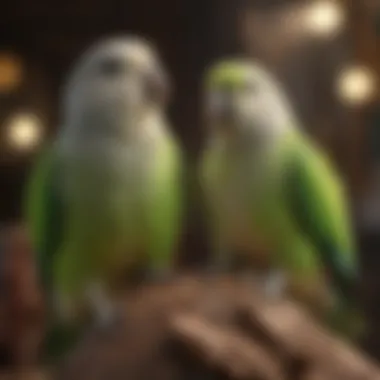
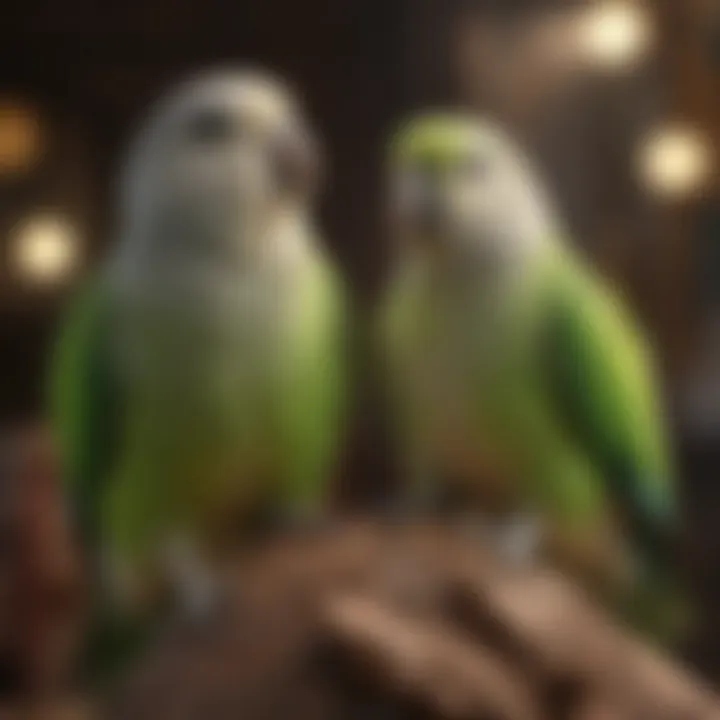
Pricing can be geographically sensitive. In urban areas with high demand for pets, Quaker parrots may retail at a premium compared to rural locations. This is an outcome of market availability and the cost of living impacting bird pricing. State regulations, transportation, and availability of certified breeders can contribute to regional price variations.
Potential owners should be mindful that traveling to acquire a bird might result in extra costs for transportation and the associated care.
Color Mutations and Variants
Quaker parrots also show a range of color mutations, influencing their market value. Traditional green Quakers may be priced lower as they are more common. However, rarer color variants, such as blue, yellow, and lutino, often demand higher prices due to limited availability in breeding populations. Collectors or those interested in specific aesthetics may find this crucial in determining which price point to consider.
Understanding the differences and the associated costs of color breeds is essential for those buyers who have preferences going beyond the average green bird.
Health Certifications
Investing in a bird with relevant health certifications can incur higher initial costs but is often worth the expense. Certification from an avian veterinarian indicating the bird is free from diseases like psittacosis or polyoma virus assures new owners regarding health risks. Certifications should cover the bird's general well-being and may also relate to breeding conditions. Allowing access to disease-free stock leads to responsible avian ownership, protecting both the new owner and future birds they might acquire.
In summary, various components play crucial roles in dictating the pricing of Quaker parrots. Owners must weigh these influences carefully, ensuring their choices serve their needs and the well-being of the bird. It's always essential to focus on long-term value over initial pricing alone.
Initial Costs of Acquisition
Understanding the initial costs associated with acquiring a Quaker parrot is a crucial aspect of avian ownership. This section sheds light on various financial elements such as purchase price, essential supplies, and setup expenses. For prospective parrot owners, these costs lay the foundation of responsible ownership and help to assess long-term financial commitment. Each component is significant and contributes to the overall experience of owning these social birds.
Purchase Price Range
The purchase price of a Quaker parrot can widely vary based on several factors, including age, attractiveness, and breeding lineage. Generally, buyers can expect to spend anywhere between $200 to up to $1,500. Rare color mutations tend to push prices higher. Purchasing from reputable breeders might also mean a higher cost compared to pet stores or adoption centers, but this often ensures better bird health and genetics.
Here is a brief overview of aspects that can influence the purchase price:
- Age of the Bird: Younger birds often come at a premium compared to older, more established individuals.
- Breeder Credentials: Highly regarded breeders with a positive reputation command a higher price due to their experience and assurance of high-quality birds.
- Color Variants: Specific pigmentation differences can elevate costs among Quaker parrots.
Deciding on what price range aligns with one's budget is an invaluable starting point before delving into ownership.
Cost of Supplies
After securing the bird, new owners must consider the costs linked to immediate and ongoing supplies. The initial setup for their habitat can substantially add to expenditures. Items required include, but are not limited to:
- Quality Cage: A suitable cage provides necessary space for the parrot, therefore, an investment of about $100 to $500 is common, depending on size and materials used.
- Food and Water Dishes: Generally affordable, yet crucial for daily living. Expect to spend approximately $10 to $30.
- Bedding and Perches: Natural perches and bedding materials can cost another $ up to $100 or more, depending on the quality and variety chosen.
Having all necessary supplies from the beginning fosters an environment that nurtures the bird's well-being and overall comfort.
Setup Expenses
Setting up a living space for a Quaker parrot has its own associated costs. Key considerations include the birdcage's placement and other environmental modifications. Owners often overlook the importance of these upfront expenses, which can significantly affect the bird's happiness.
Considerations include:
- Cage Accessories: Included are toys and enrichment items essential for mental stimulation. This can be an additional $50 to $200.
- Initial Food Supply: A diet suitable for Quaker parrots typically costs between $20 to $50 monthly.
- Impact of Location: Expenses can vary based on area. Costs maybe higher in urban settings due to rising demand and competition.
Before embarking on the journey of parrot ownership, awareness of the initial costs lets individuals budget accordingly. Quaker parrots are not merely trendy pets; they require careful financial planning to ensure they live a healthy and enriching life in their new home.
Ongoing Expenses Encountered
Understanding ongoing expenses involved in owning a Quaker parrot is crucial for anyone considering this intelligent and social bird. Aside from the initial costs, ongoing financial responsibilities undeniably shape the overall experience of pet ownership. Identifying these expenses allows potential owners to make informed decisions to promote the well-being of their feathered companions.
Dietary Requirements and Costs
Providing a balanced diet is fundamental to keeping a Quaker parrot healthy. Their primary diet consists of high-quality pellets, seeds, and a variety of fresh fruits and vegetables. Costs can vary depending on quality and type:
- Pellets: A good brand can cost around $20 to $25 for a 5-pound bag.
- Fresh Foods: Monthly expenses on fruits and vegetables may add up to $15 or higher, depending on how much your bird consumes.
- Seeds and Treats: This can frequently be an additional $10 to $15 monthly.
By investing in proper dietary choices, you're helping to prevent potential health issues that could arise from an unbalanced diet, therefore ultimately saving cost on veterinary care down the road.
Routine Veterinary Care
Routine veterinary visits are crucial for ensuring your Quaker parrot's ongoing health. Depending on the services rendered, expenses can add up each year. Bird owners should consider:
- Annual Check-ups: Expect costs to fall within $50 to $100 per visit.
- Diagnostic Tests: If needed, additional testing could be $100 to $300, greatly depending on the nature of the tests.
Establishing a trusted veterinarian who specializes in avian care ensures friendly and knowledgeable expertise, aiding in preventing diseases and other health issues.
Enrichment and Toys
Quaker parrots are social and intelligent birds that require mental stimulation. Lack of enrichment can lead to boredom and behavioral issues. Evaluating and budgeting for toys is vital. A single toy typically costs ranging from $5 to $30:
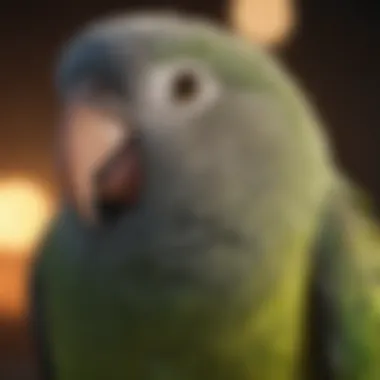
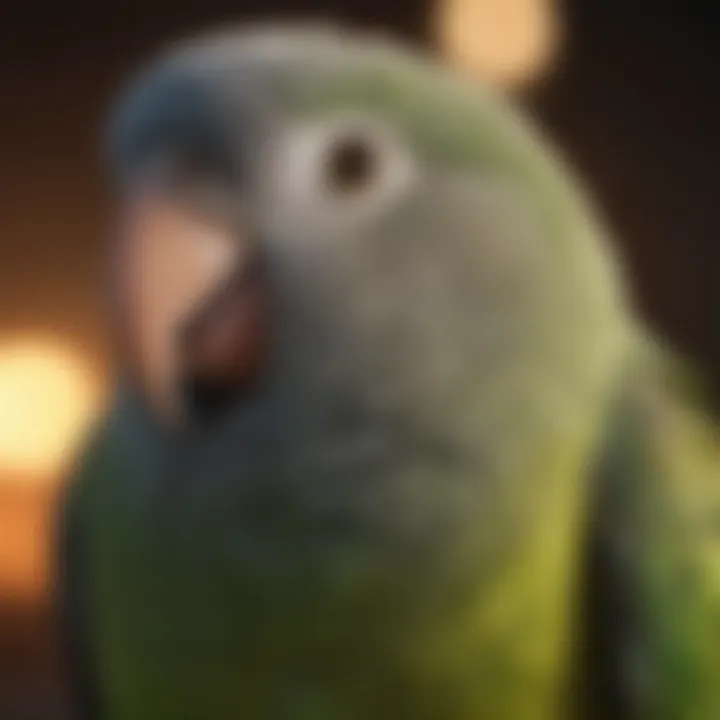
- Rotate the toys every few weeks to keep your bird engaged.
- Be proactive and plan to set aside roughly $10 to $50 monthly to foster a healthy environment.
Investing in proper toys, such as interactive puzzles or biodegradable materials, leads to lasting satisfaction for the pet. It may seem like frivolous spending, yet without proper enrichment, birds may become stressy or inclined towards destructive behavior.
Insurance Options
Although not mandatory, considering pet insurance for your Quaker parrot could save a significant financial burden in case of accidents or health issues. Understandably, not all owners might feel the same but the tranquility of knowing that unexpected expenses can be covered speaks to the value upon reflection. Common elements include:
- Monthly Premiums: Premiums generally range from $10 to $50.
- Self-insured vs. Insurance: Weighing risks can indicate if this avenue makes sense for you.
By carefully evaluating and budgeting for ongoing expenses, you ensure necessary elements that enrich the quality of life for your parrot, promoting both its health and happiness. While the up-front and ongoing costs might appear overwhelming at first glance, such considerations are key not only for the bird but reflect investing in a truly rewarding companionship.
Price Comparisons with Other Parrots
When contemplating the cost associated with pet ownership, especially for a Quaker parrot, it becomes essential to place the individual price into the broader context of parrot ownership. Understanding how the price of a Quaker parrot compares with other species of parrots allows potential pet owners to make well-informed financial decisions. This comparison helps in gauging not only the purchase price but also future expenses which may include food, insurance, and veterinary care.
Comparing with Popular Species
In the realm of pet parrots, options vary widely, ranging in price from a few hundred dollars to several thousand. For instance, species like the African Grey or Macaw command higher prices due to their rarity and higher cost of care.
- Quaker Parrots: Generally fall between $300 and $1,000.
- Australian Budgerigar: Can be as low as $20 to $100.
- Cockatiel: Might range from $70 to $250.
- Amazon Parrots: Typically cost between $400 and $1,000.
When considering these costs, a Quaker parrot is positioned favorably, offering a balance between accessibility and unique traits that appeal to bird lovers. Moreover, their sociable nature can provide ample emotional rewards which tend to justify the expenditure.
Market Trends for Parrots
Monitoring market trends for parrots can reveal significant information regarding pricing fluctuations. Various factors contribute to these trends, such as seasonality in breeding, shifts in consumer interest, and the impacts of global events on supply chains.
- High Demand: Popular species, including the Quaker parrot, may see a price rise during peak breeding seasons or holidays.
- Unhandled Birds: Prices may dip for less domestically bred birds, as some buyers prefer impeccably raised parrots with proven socialization backgrounds.
- Economic Factors: General economic conditions impacting discretionary spending can lead to adjustments in parrot prices across species.
Appreciating these dynamics can assist prospective buyers not just in selecting a species aligned with personal budget, but also in timing a purchase when conditions might favor a better price.
Price comparisons across different parrot species and market trends may aid potential pet parents in deciphering value versus cost, ultimately resulting in a more gratifying ownership experience.
Regional Insights on Pricing
North America
In North America, the price of Quaker parrots tends to vary significantly between the U.S. and Canada. In the United States, prices often hover around $300 to $800, with variation based on specific states and breeders. Down south, warm weather states can see higher demands leading to inflated costs. Factors such as availability, demand, and breed reputation contribute to these price differences. Additionally, some areas have a surge of seasoned breeders who command higher prices due to their established reputation. Others may offer competitive rates for less experienced owners. Before purchasing, potential parrot owners should consider researching local breeders through platforms such as reddit.com and social media groups.
Europe
In Europe, Quaker parrots are commonly referred to as Monk Parakeets, and prices are shaped by various laws depending on the country. In countries such as Germany and the UK, acquisition prices range from €400 to over €1,000, depending on the color mutation and health certifications of the bird. Regulations can influence the market, especially concerning breeding practices and the legality of selling Quaker parrots in certain regions. The European market retains a keen interest in ethical sourcing, assuring that birds come from breeders who adhere to welfare guidelines. Therefore, individuals seeking to purchase should remain alert for哪些 breeders contribute to the market.
Asia and Other Regions
In Asia, the availability and price of Quaker parrots vary greatly, depending on the country and urban versus rural settings. In nations such as India and Japan, breeders might charge prices similar to those in North America, while availability injections can cause prices to surge. In contrast, in other regions, lower importing costs can mean a more reasonable price range. Many avian enthusiasts across Asia have been increasingly vocal on forums. Bird-sharing platforms and social media outlets offer guidance on pricing standards. Awareness of local customs is crucial, as prices and availability might shift accordingly.
Note: Prices generally fluctuate due to market trends and demand. Thorough market study can relieve potential joining bikers from overspending and security issues.
By considering these regional pricing insights, potential owners can develop a better understanding of how location can affect not only acquisition costs but also the overall long-term commitment that comes with caring for a Quaker parrot.
Evaluating the Value of a Quaker Parrot
Evaluating the value of a Quaker parrot involves more than just assessing its purchase price. It requires a comprehensive understanding of the long-term commitment and the emotional and social benefits they may bring to their owners. Owners must consider various factors that contribute to the overall value of keeping these birds as companions.
Long-term Commitment
Owning a Quaker parrot amounts to a significant commitment that spans many years. These birds have a typical lifespan of 15 to 30 years, depending on their care and overall health. It is crucial to appreciate the daily responsibilities involved in caring for them, which can include feeding, cleaning, and ensuring social interaction. Lack of attention can lead to behavioral problems, which could strain the relationship between bird and owner.
Maintaining a consistent routine, including providing mental stimulation and community, often requires considerable time each day. The realization of this need highlights the importance of dedicating sufficient resources to properly integrate a Quaker parrot into one’s life for the long haul.
Important aspects to keep in mind include:
- Daily interaction: Regular social time prevents loneliness.
- Routine care: This includes everyday feeding and cleaning of their environment.
- Health monitoring: Periodic vet visits are necessary for check-ups and vaccinations.
Overall, investing time and effort is as significant as making a financial expenditure.
Emotional and Social Benefits
Quaker parrots are well-known for their charming personalities and intelligence. Their social behavior often leads to strong emotional connections with their owners. The following elements encompass the emotional and social benefits that may arise from their companionship:
- Companionship: They thrive on social interaction, which fosters a sense of belonging.
- Communication: Quaker parrots can learn vocabulary and mimic sounds. This can enhance their interaction capabilities, opening avenues for rich communication and bonding.
- Emotional Support: Many owners find comfort in their birds, helping reduce stress and contributing to better mental health.
As such, owning a Quaker parrot can serve as more than a pet experience. It involves an emotional investment that develops over years of care and interaction.
“Considering the psychological effects of pet ownership, niches like high-demand birds such as Quaker parrots can offer significant enriching experiences.”















